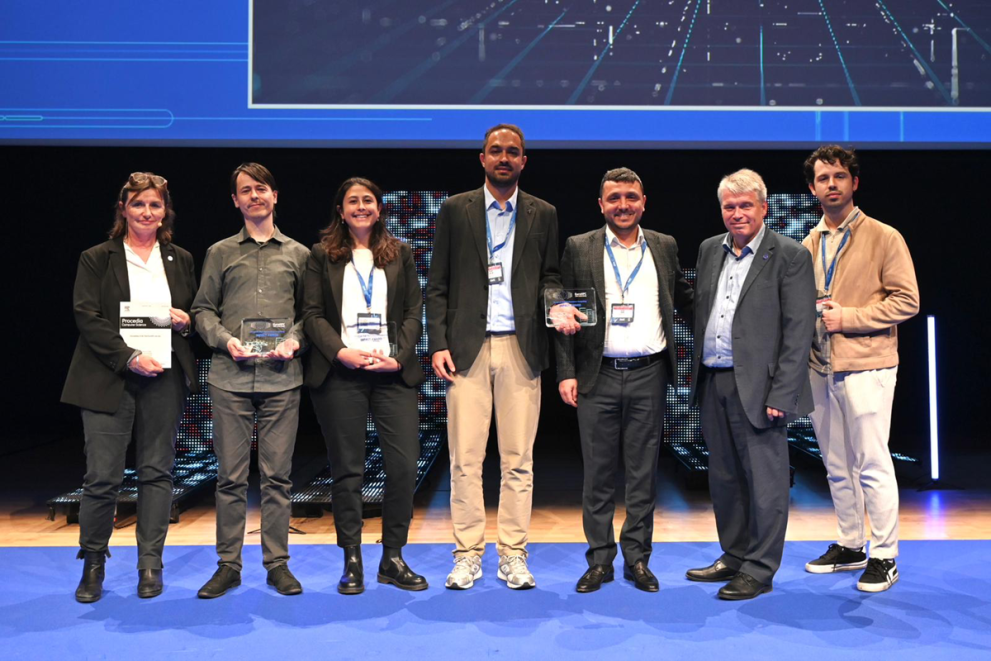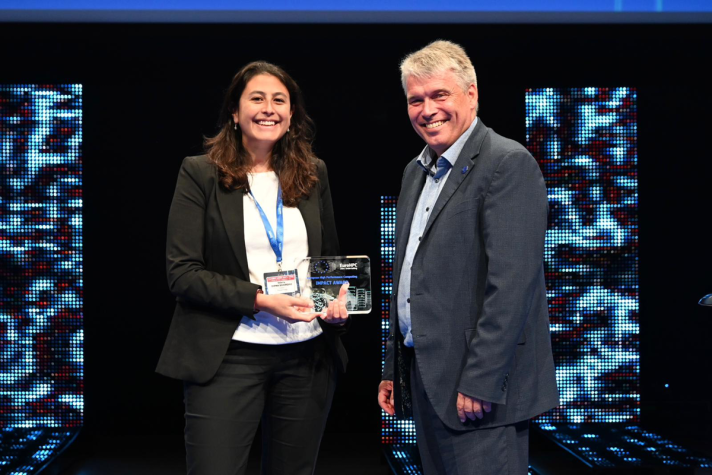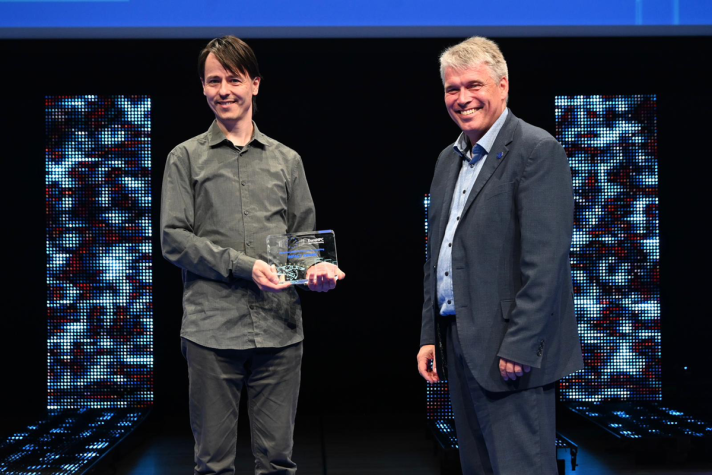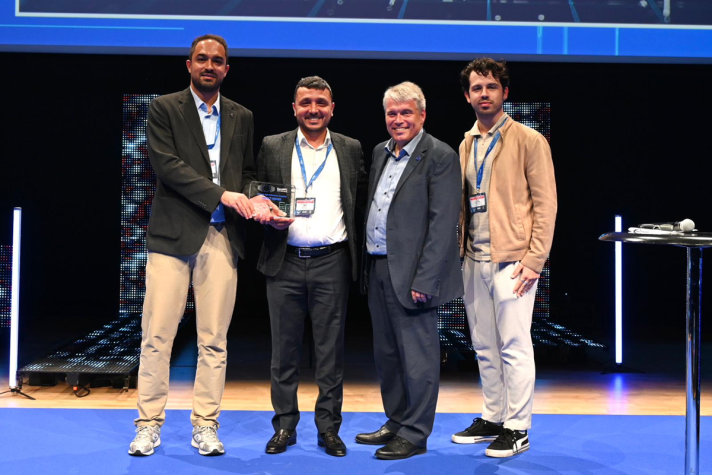
Best EuroHPC User
The 2025 Best EuroHPC User award was presented to Dr. Valeria Ospina-Bohorquez from Focused Energy GmbH, based in Darmstadt, Germany.
This award recognises Dr. Ospina-Bohorquez for her exemplary and strategic use of EuroHPC resources, highlighting her expertise in optimising workloads on EuroHPC supercomputers and outstanding project management across multiple EuroHPC Regular Access calls.
The selection was made by the EuroHPC JU Hosting Entities, which are the supercomputing centres hosting and operating the EuroHPC operational systems.
Dr. Ospina-Bohorquez was selected for her work on three successful projects. One project in 2023 was conducted through the Benchmark Access Call, while the other two were supported via Regular Access Calls including one ongoing project, all of which received positive scientific evaluation marks.
Her research focuses on proton fast ignition, an advanced method in fusion energy studies. This approach seeks to replicate, on Earth, the same processes that power the sun and other stars. By producing highly energetic proton beams to ignite small fuel targets, her work contributes to the development of clean, virtually limitless energy.
In addition, she was also recommended for consistently strong project oversight and timely reporting. The Hosting Entities made a special mention of Dr Ospina-Bohorquez's proactive and constructive communication with user support teams.
Overall, Dr. Ospina Bohoequez was also nominated for her deep technical understanding of energy conservation principles and her commitment to effective code performance on CPU-based systems on the Karolina and VEGA supercomputers.
Best Paper Awards
This year, two papers have been recognised with Best Paper Awards at the EuroHPC User Days 2025.
During the spring of 2025, users of the EuroHPC JU systems were invited to submit their manuscripts on projects using EuroHPC resources. Submitted papers were evaluated by a scientific review board and selected for presentation at EuroHPC User Days 2025, as well as for publication in the Elsevier Procedia Computer Science of the EuroHPC User Days 2025 Book of Proceedings.
Dr. Szabolcs Borsanyi, from the Wuppertal University in Germany has been awarded the Best Paper at EuroHPC User Days 2025 for his paper submission "The QCD crossover line in a finite volume”.
The scientific review board selected the paper based on its scientific originality and relevance, the complexity and scale of the simulations, and the clarity and quality of the results. Reviewers highlighted the paper’s clear and accessible presentation, even for non-experts, and its efficient use of computing resources. The paper was also praised for its excellent reporting on the current status and future perspectives on lattice Quantum Chromodynamics (QCD), a method to study the particles inside protons and neutrons.
In this context, the project explores how strongly interacting matter changes phase under extreme conditions, such as those found in the universe. Using large-scale lattice QCD simulations, the team was able to accurately determine the “crossover line” in the QCD phase diagram, which marks the boundary between different states of matter. This research helps deepen understanding of the fundamental structure of matter.
Mr. Borsany was awarded 1,715,200 node hours on the LUMI-G system with his ongoing 2-year project “Criticality on the QCD phase diagram from lattice QCD”, awarded through the EuroHPC Extreme Scale Access Call.
Özgür Uğur and his team were awarded Best Paper 2025 for their submission “Tailoring AI for Turkish Law: Domain-Specific Fine-Tuning of Small Language Models for Legal Expertise”. Özgür Uğur is an AI Engineer at NewMind AI, in Istanbul, Türkiye.
The scientific review board selected this paper in recognition of its clear and well-structured approach, innovative use of AI in a national legal domain, and effective fine-tuning methods that delivered strong results with minimal computational resources.
The project aimed to develop specialised AI tools for the Turkish legal sector by training a compact, open-source language model on carefully curated texts from ten distinct areas of law, including tax, labour, data protection, environmental law, and more. In this way, the team demonstrated that compact, open-source language models can be fine-tuned effectively to perform specialised legal tasks, achieving high-quality results without relying on large, proprietary AI systems.
The project received 400 node hours and was conducted on the Karolina GPU partition. It was applied for through the EuroHPC Benchmark Access Call.
In congratulating the awardees, Anders Jensen, the EuroHPC JU Executive Director stated:
“These awards highlight the exceptional talents driving projects on EuroHPC supercomputers. Their accomplishments demonstrate how EuroHPC resources enable groundbreaking science, technological advancement, and real-world impact, embodying the innovative spirit at the core of the European HPC ecosystem.”
Background
The third EuroHPC User Days took place on 30 September and 1 October 2025 at the Royal Danish Library's Cultural Centre in Copenhagen, Denmark. With a participation of more than 300 people, the event is an important moment in the year to engage with EuroHPC user communities and celebrate the successful research projects undertaken with the use of EuroHPC infrastructure. The EuroHPC User Days event is an annual opportunity for knowledge sharing, dissemination, and networking for EuroHPC users communities.
The proceedings of EuroHPC User Days 2023 and 2024 can be consulted on the dedicated page.
The EuroHPC JU is a legal and funding entity that brings together the European Union and participating countries to coordinate efforts and pool resources with the objective of making Europe a world leader in supercomputing.
To equip Europe with a cutting-edge supercomputing infrastructure, the EuroHPC JU has already procured 11 supercomputers, distributed across Europe. Three of these EuroHPC supercomputers are now ranked among the world’s top 10 most powerful supercomputers: JUPITER in Germany ranks at 4, becoming Europe’s new fastest Supercomputer along with LUMI in Finland (9th place), Leonardo in Italy (10th place).
European scientists and users from the public sector and industry can benefit from EuroHPC supercomputers via the EuroHPC Access Calls no matter where in Europe they are located, to advance science and support the development of a wide range of applications with industrial, scientific and societal relevance for Europe.
Currently, the EuroHPC JU is also overseeing the implementation of 13 AI factories across Europe that offer free, customised support to SMEs and startups. Additionally, the EuroHPC JU is deploying a European Quantum Computing infrastructure, integrating diverse European quantum computing technologies with existing supercomputers.
The EuroHPC JU also funds research and innovation projects to develop a full European supercomputing supply chain, from processors and software to applications to be run on these supercomputers and know-how to develop strong European HPC expertise.
Details
- Publication date
- 2 October 2025
- Author
- European High-Performance Computing Joint Undertaking


